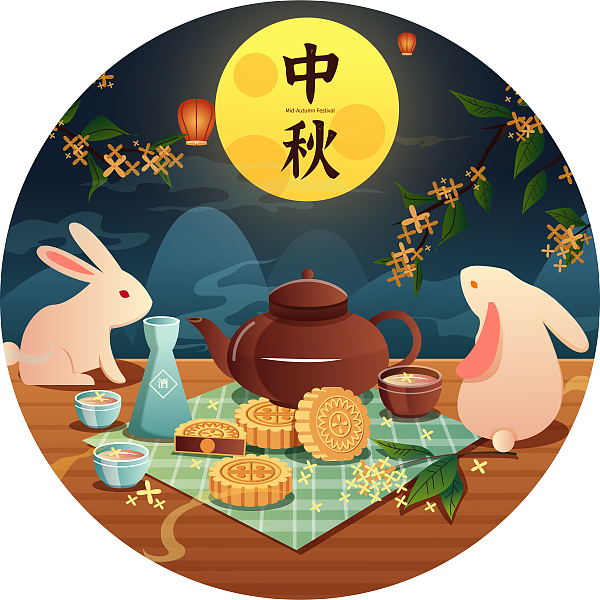My favorite things about Mid-Autumn Festival
- By Mitchell Blatt
 0 Comment(s)
0 Comment(s) Print
Print E-mail China.org.cn, September 10, 2022
E-mail China.org.cn, September 10, 2022

Mid-Autumn Festival is here! It is one of China's seven national holidays and one of my favorites.
Mid-Autumn Festival (Zhongqiu Jie) celebrates the harvest season and the legend of the moon goddess, Chang'e. As the story goes, Chang'e drank the elixir of immortality and flew to the moon, where she lives to this day with her pet, the Jade Rabbit. Her husband, Houyi, who saved the people from the brutal heat of the 10 suns, began offering cakes and fruits to Chang'e after she became stuck on the moon, and then many people who admired Chang'e and Houyi started to do the same.
I have celebrated Mid-Autumn Festival in China, the U.S., with the Chinese Students and Scholars Association (CSSA), and South Korea, where the festival is called Chuseok. There are different traditions associated with this holiday everywhere it is celebrated. Even different regions of China have their own traditions. But some traditions are very similar and widespread.
Lanterns are displayed in public parks to light up the night. People gather and look at the sky to admire the full moon. The moon represents the passage of time, since it is used to track the months on the Chinese calendar. In some regions, it symbolizes fertility when the whole moon blossoms in the middle of the 8th month, and the fruits and vegetables planted in the summer are ripe and ready to be harvested.
During the Mid-Autumn Festival holiday in 2012, I stayed in a rustic wooden hostel near the Er Hai alpine lake in Shuanglang, Dali county of Yunnan. On the night of Zhongqiu Jie, the hostel hosted a splendid feast on three long picnic tables for all the guests. Some guests and volunteer staff cooked their homemade specialties. Others brought bottles of the traditional Chinese liquor bai jiu and were generous in pouring it (a little bit too generous).
Afterward, we banged on drums, strummed guitars, and looked at the moon's reflection over the vast Er Hai. The view of the moon is famous in Dali. Dali is called the land of the "Wind, Flower, Snow, and Moon" – referring to the wind over Xiaguan, the splendid flowers of Shangguan, the snowcapped peak of Cangshan mountain, and the glistening reflection of the moon on the water of Er Hai.
Of course, we ate mooncakes, too. Mooncakes are my favorite festive snack. I tried mooncakes for the first time as a student at Indiana University (IU) in the U.S. while celebrating Mid-Autumn Festival with my Chinese classmates. They were happy to share their traditions with me and gave me a lot of extra mooncakes when they saw how much I loved them.
The intricate designs of the mooncakes make them works of art as well as delicacies. They may come with designs of flowers, the Jade Rabbit, or Chang'e, and characters symbolizing "longevity." They come in all varieties of flavors. My favorites are the traditional lotus paste, red bean, and rose flavor.
I used to like mooncakes so much that when I moved back to China in 2013, I was looking for mooncakes in June. After moving into a shared apartment, one of my co-rental mates said, "I saw a strange foreigner asking for a mooncake at the convenience store even though Mid-Autumn Festival is not for a few months." I said, "That strange foreigner was me!"
Different games are played during the Mid-Autumn Festival, many of which I have only read about. Apparently, in Fujian, there is a dice game called Bo Bing, where six people throw dice in a bowl and try to roll five-of-a-kind. That would be fun to play. In this urbanized digital age, I fear some traditions may be fading.
Back at IU, the CSSA set up bouncy slides and other festivities and got together in the field. The games you play or the things you do to celebrate need not be centuries old. Mid-Autumn Festival is about treasuring your time with friends and family.
Mitchell Blatt is a columnist with China.org.cn. For more information please visit:
http://www.china.org.cn/opinion/MitchellBlatt.htm
Opinion articles reflect the views of their authors, not necessarily those of China.org.cn.
If you would like to contribute, please contact us at opinion@china.org.cn.






Go to Forum >>0 Comment(s)